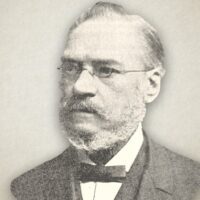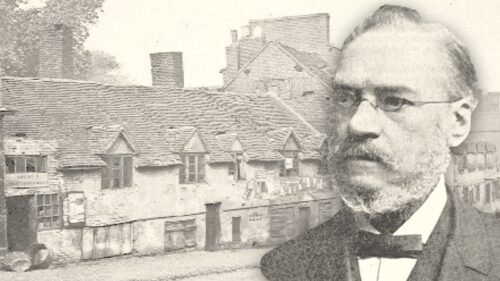
Hope An Anchor
A Sermon Preached By William Osmond
“Which hope we have as an anchor of the soul, both sure and stedfast.”—Heb. 6:19
Hope is an expectation of good; it supposes that what a man hopes for, is not now in possession, that the attainment of it is possible, whatever difficulties there may be in the way; otherwise, however excellent, it would produce despair rather than hope. The nearer the object appears to be, the stronger the expectation. The word “hope” is derived from Heb, “Havah,” which signifieth to expect, or wait; and it denotes a very vehement intention, both of body and mind, in waiting, expecting, or hoping; when one waits, as it were, stretching forth his spirit or mind, putting himself out exceedingly to hope or wait for a thing.—B. K. (Desire, anticipation, expectation, is the believer’s hope.) Hope is a divine and supernatural grace or fruit of the Holy Spirit, and may be thus Scripturally described:—
First, It is a patient and well-grounded expectation of whatsoever God hath promised. God is the author of it. He is called the “Hope of Israel,” and “the God of Hope.” The believer is made the subject of this hope. The object in a strict sense is God, who comprehends “all the good that saints dwell in the faith and expectation of.” The Psalmist said, “Lord, What wait I for? My hope is “Thee.” In a wider sense it is the good of the promise not in hand, or already accomplished, but to be performed hereafter. “Hope that is seen is not hope: for what a man seeth, why doth he yet hope for it?” (Rom. 8:24). Faith is distinguished from hope, inasmuch as it gives present being to the promise, and is the substance of things hoped for: the good of the promise hath an earnest in the soul; it is in heaven, and brings the believer and heaven together. The Christian’s life is a life of hope or expectation. The promises of God are not directly accomplished. He seems to stay long before He makes good what He hath engaged to give them; and though He stay long before He performs His promises, if they shall be accomplished at last in the best time, to the eternal joy our hearts. “Hope deferred makes the heart sick,” but when it comes it is a tree of life. The vision is for an appointed time, but at the end it shall speak and not lie.
Now, this hope that is called the anchor of the soul is not a hope of being rich, or great and mighty in the world. Many make gold their hope, others length of days, &c. But this is not the “hope which is the anchor to the soul,” compared thereto:—(1) An anchor is a good stay and security to a ship in a storm. What would the mariner do had he no anchor to cast out of the ship when he is in danger of rocks and sands? So hope in God, through Christ, is a most excellent stay for the soul of a believer in a day of trouble and persecution. ”They suffered joyfully the spoiling of their goods, knowing in themselves they had in heaven a better and enduring substance” (Heb. 10:34). We are saved by hope. It stays the soul as an anchor does the ship. (2) An anchor takes hold of something which is out of sight. So hope, the anchor of the soul, takes hold of something which is not seen with carnal eyes which is within the veil. (3) An anchor, when it takes hold of a rock or firm ground fastens and stays a ship more steadily, preserving it from shipwreck. So hope, taking hold of Christ, the Rock, stays the soul in perilous time, and is safe in spiritual shipwreck. (4) An anchor needs a cable or chain. So hope, without faith and love of Christ (Rom. 8:29, 30), will avail little in the time of need. (5) So the anchor must be rightly cast, and here is the power and grace of God the Holy Ghost brought into special operation in order that the anchor of hope should be cast within the veil, whither the forerunner is for us entered, even Jesus (Heb. 6:19, 20). An anchor is cast into the sea. The believer’s anchor is cast upward. Saints’ hope is in heaven. Anchors sometimes let go their hold and are lost, and ships likewise. But this our anchor, both sure and stedfast; no danger of its being lost or broken. The saints of God would be in a sad condition if their hope should fail them. A saint’s standing in Christ is firm. The covenant is ordered in all things and sure. But to confirm this glorious truth that hope is both sure and stedfast, an ancient divine hath said: “Consider the many strong bars that are cemented together, as so many bars of iron, hammered by the Spirit to the making of this blessed anchor of the soul both sure and stedfast.”
I shall mention some of the Scriptural grounds of the saint’s hope:— First, The love of God is a sure ground of the saint’s hope. Jer. 31:3: “I have loved thee with an everlasting love, therefore with lovingkindness have I drawn thee.” In Rom. 8:38, 39, Paul says, “I am persuaded, that neither death, nor life, nor angels, nor principalities, nor powers, nor things present, nor things to come, nor height, nor depth, nor any other creature, shall be able to separate us from the love of God, which is in Christ Jesus our Lord.” I take this to mean all the persons that are possessed of this hope. This hope is above nature or that which is natural; it is supernatural. Paul (1 Tim. 1:1) says: “God our Savior and Lord Jesus Christ, which is our hope.” Then Peter 1:3 says: “Blessed be the God and Father of our Lord Jesus Christ, which according to His abundant mercy hath begotten us again to a lively hope by the resurrection of Jesus Christ from the dead.” Then the apostle calls it a blessed hope (Titus 1:2), and the Old Testament saints were blessed with the same faith, and hope, and love as we now, the children of God and servants of Christ, having the same spiritual gifts of grace and eternal life in Christ Jesus our Lord, the center of all blessedness and bliss. Sure and stedfast; grounded in the love of God in Christ Jesus, by the revelation of the Holy Spirit in the word of the truth of the Gospel.
But again, the Person (complex) of our Lord Jesus Christ, His precious atoning blood, and His perfect righteousness, His holy life, sacred death, and glorious resurrection from the grave. Peter says: “Him hath God exalted with His own right hand to be a Prince and Saviour,” &c. (Acts 5:31). The anchor-stay of the soul, the believer’s sure ground of hope, and in addition to this, Jesus’ glorious intercession and advocacy, representing before His Father all that hope in Him and in His mercy. And surely the mercy of God is the poor sinner’s only hope.
But further, I am led to think that the covenant of grace is the basis of the believer’s hope, not the covenant of works, which is conditional, but the covenant which is unconditional, well ordered in all things and sure—all David’s desire, or hope of salvation. This, in the highest sense, is the language of David’s Lord. Hence, from this everlasting covenant flow the sure mercies of David, and to all the beloved of God. And then the “fulness of grace,” which is treasured up in Christ for believers, is a sure ground of hope. Col. 1:19: “It pleased the Father,” &c. Support and help in time of need and danger, fulness of wisdom to instruct and counsel, fulness of love and care to guide, a fulness of power and strength to hold them up that they may be safe, and to stay them from sinking, a fulness of pity and compassion in all their distresses, and a fulness of grace and mercy to pardon and fully blot out all their sins and failings, and be with them in all their sorrows and sufferings. Therefore the saint’s hope of salvation is both sure and stedfast. And then, the oath and promise of God in the verse previous to our text: “In hope of eternal life, which God, that cannot lie, promised before the world began” (Titus 1:2). And then, the almighty power of God is a sure ground of hope. 1 Pet. 1:5: “Who are kept by the power of God, through faith unto salvation.”
Lastly, the relation which believers stand in unto God is a sure and steadfast ground of hope. He is their Father, and they His dear children, the Lord Jesus their Elder Brother, the Holy Spirit their inward life and comfort. The love of God in Christ, by the Spirit revealed, exceeds—far exceeds—the love of earthly parents and relationships. And so we have briefly endeavoured to set before you (no doubt) what you have already known and experienced. There are several more things I might have brought bearing upon this subject, but time forbids. I pray that the Lord may bless these few thoughts to our soul’s profit, and His eternal glory. Oh, that we all may be able to say from our hearts by the Holy Ghost given unto us:
“My hope is built on nothing less
Than Jesus’ blood and righteousness.”
Amen.
William Osmond (1825-1995) was a Strict and Particular Baptist preacher. He served as pastor for the churches meeting at (1) Bethel, Hoxton; (2) Carmel, Woolwich; (3) Elthorne-road, Holloway.




